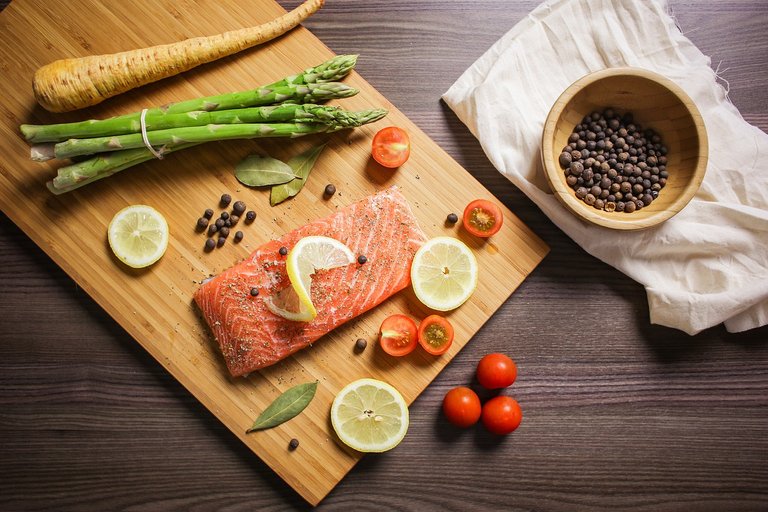
Nutrient density is the ratio of a food’s energy content to its nutritional components. Foods high on the nutrient density scale means they contain higher levels of nutrients compared to how many calories they contain.
Nutrient dense foods are loaded with minerals, vitamins and other nutrients which keep you in optimum physical, emotional and mental health. Furthermore, they’re low in sodium, added sugars and saturated fats.
Here are 10 foods that are very high nutrient density.
Salmon
Salmon is the richest in omega-3 fatty acids which play a vital role in lowering risk of diseases and improving overall health. In addition, salmon is packed with other types of nutrients as selenium, potassium, magnesium, as well as all the vitamin Bs. Low in calories and quite simple to prepare, you should make salmon part of your weekly diet.
Kale
Kale is one of the healthiest of the leafy green vegetables, even more than spinach, which contains oxalates. One of the most nutrient dense foods you can ever eat, kale is rich in minerals, vitamins and cancer-fighting compounds.
Garlic
Garlic is one of the most versatile, and nutritious, foods out there. Containing high amounts of calcium, potassium, copper, manganese, selenium and allicin, its active ingredient, garlic lowers high blood pressure, reduces risk of heart disease, has cancer fighting compounds, along with its antibacterial and antifungal properties.
Potatoes
Potatoes usually take a bad rap for being starchy and fattening, but in fact, potatoes contain high levels of some of the most essential nutrients your body needs on a daily basis; potassium, magnesium, iron, copper, vitamin C and most of the vitamin B group. They may be high-carb foods, but eaten in moderation, potatoes really are nutritionally ideal.
Blueberries
Blueberries are exceptional fruits, and it’s in their high antioxidant intake where they really excel. They lower blood pressure and maintain healthy cholesterol levels in the blood. Blueberries also can improve memory and have powerful cancer-fighting agents.
Dark chocolate
We’re all ecstatic at the fact that chocolate is actually good for you. But first, you have to know the right type of chocolate to eat. The ones that are good for you are those high in cocoa content, in fact, it should be at least over 70% (85% cocoa content is the best).
Sadly, even though it’s good for your heart, blood pressure, brain function, it’s still loaded with calories. So, enjoy no more than 2 small squares of dark chocolate daily as a delicious way to supplement your diet.
Sardines
Since they’re part of the ‘fatty’ fish group, sardines are extremely nutritious mainly because they can be eaten whole. They’re low in calories, high in omega-3s, antioxidants, vitamins and minerals making them pretty much perfect from a nutritional viewpoint. And the best part is that they can be eaten cold, on their own, in a salad, mashed up or right out of their tin can - how simple is that?
Egg yolks
Even though yolks are often frowned upon because it’s believed they’re high in cholesterol, the truth is that bad cholesterol doesn’t come from cholesterol in foods; it comes from trans fats found in processed foods. This means that if you eat no more than 4 whole eggs per week, you’re on the right track.
In fact, whole eggs have been termed ‘nature’s multivitamin’ because of their high content of a slew of nutritional benefits, such as choline, which is good for healthy brain function, Zeaxanthin and Lutein which protect the eyes, as well as protein and healthy fats which can actually help you lose weight.
Shellfish
This group of sea organisms includes oysters, clams, and others. They are some of the best sources of vitamin B12, zinc, copper, vitamin D, just to name a few. Even though people don’t consume them enough, shellfish are a powerhouse when it comes to nutritional value.
Liver
Truly underrated, liver ranks high on the nutrient density scale because it provides you with so many vital nutrients and in huge amounts.
If you eat 100-gram portion of beef liver once a week, you’ll get:
• 1170% RDA of B vitamins
• 714% RDA of copper
• 634% RDA of vitamin A
• More than 30% of the RDA for iron, zinc, phosphorus, selenium
• Over 29 grams of high quality animal protein
By providing your body with the right types of foods, you’re boosting metabolism, maintaining energy levels and reducing your risk of chronic diseases, such as high blood pressure, cardiovascular diseases and type-2 diabetes.
By including nutrient dense foods into your diet, you provide your body with the nutrients it needs without consuming too many calories.
https://practicallongevity.com/clean-eating-healthy-anti-aging-diet/